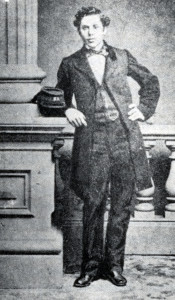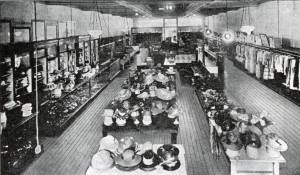Orangeburg History
Midlands Merchants: The Jews of Orangeburg and Vicinity
German Jews began settling in Orangeburgh (as it was originally spelled) in the early 1840s, once railroads connected the village of fewer than 400 to Charleston and Columbia. By 1853, the town’s population had more than doubled. Originally established as an Indian trading post called Edisto, the settlement was renamed in honor of King George II’s son-in-law, William IV, Prince of Orange, by German-Swiss immigrants in the early 18th century. Situated on hilly ground near the Edisto River, Orangeburg was surrounded by a well populated farming region. Cotton production, together with the railroads, helped to make many 19th-century farmers in the district wealthy.
 Ten-year-old Theodore Kohn, one of the town’s first Jewish residents, emigrated from Germany in 1850 with his parents and a brother and settled in Orangeburg the same year. Kohn served in the Edisto Rifles during the Civil War. In the postwar period he became a respected businessman and an important contributor to civic affairs, serving as a town alderman, a founding member of Edisto Bank, and a major force behind the creation of Orangeburg’s public schools. Dubbed the “Father of Orangeburg graded schools,” he was also a member of the Masonic Shibboleth Lodge, serving as its treasurer for more than two decades.
Ten-year-old Theodore Kohn, one of the town’s first Jewish residents, emigrated from Germany in 1850 with his parents and a brother and settled in Orangeburg the same year. Kohn served in the Edisto Rifles during the Civil War. In the postwar period he became a respected businessman and an important contributor to civic affairs, serving as a town alderman, a founding member of Edisto Bank, and a major force behind the creation of Orangeburg’s public schools. Dubbed the “Father of Orangeburg graded schools,” he was also a member of the Masonic Shibboleth Lodge, serving as its treasurer for more than two decades.
When he first arrived in Orangeburg, Kohn worked for his uncle, Deopold Louis, an established merchant and possibly the earliest Jewish settler in town. In 1868, Theodore and a friend opened a general merchandise store, Ezekial and Kohn. Their association appears to have been brief, however, since a year later Theodore’s brother Henry joined him in a mercantile business, Theodore Kohn and Brother. Later, Henry broke away from Theodore to open his own store.
Born in Orangeburg in 1850, Henry made his mark on the community as a founder of the Young America Fire Company and a Mason. In partnership with his wife, Matilda Baum Kohn, he organized and led the Orangeburg Philharmonic Orchestra Henry and Matilda directed the group of amateur musicians for almost 50 years. Henry, himself a violinist and a violin instructor, was admired for his dedication to bringing music to the city.
 Shopkeepers, Tradesmen, and Land Owners: After the Civil War, Orangeburg dropped the “h” at the end of its name and incorporated as a city. Cotton farming continued to be the county’s economic mainstay, supplemented by a diversity of food crops, including corn, oats, wheat, rye, rice, potatoes, pecans, and peanuts. The nearby towns of Bowman, Branchville, St. Matthews, Elloree, Eutawville, and Blackville all attracted Jewish settlers. Many of the newcomers were landsmen, hailing from the same part of the Old Country, or were linked by marriage.
Shopkeepers, Tradesmen, and Land Owners: After the Civil War, Orangeburg dropped the “h” at the end of its name and incorporated as a city. Cotton farming continued to be the county’s economic mainstay, supplemented by a diversity of food crops, including corn, oats, wheat, rye, rice, potatoes, pecans, and peanuts. The nearby towns of Bowman, Branchville, St. Matthews, Elloree, Eutawville, and Blackville all attracted Jewish settlers. Many of the newcomers were landsmen, hailing from the same part of the Old Country, or were linked by marriage.